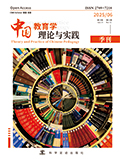

自改革开放以来, 我国在“教、学、评”一致性课程评价研究方面已经走过了四十余年的历程。这一研究领域先后经历了“拿来主义”、“立足国情”和“深化改革”三个阶段。在这个过程中, 学界对有教无评、有评无促、以评促学、教学评一体化等基本评价元素的探讨取得了明显的成果和进展。然而, 未来的“教、学、评”一致性研究需要更加关注促进课程实施、解码课程标准、组织评估任务和实施学习活动, 并对一致性功能进行更深入的反思和延伸。为了实现这一目标, 我们需要采取一系列措施。首先, 加强对课程实施的促进。同时, 还需要建立有效的反馈机制, 及时了解课程实施中的问题和挑战, 并采取相应的措施加以解决。其次, 深入解码课程标准。第三, 组织好评估任务。最后, 积极实施学习活动。总之, 未来的“教、学、评”一致性研究需要更加关注促进课程实施、解码课程标准、组织评估任务和实施学习活动, 并对一致性功能进行更深入的反思和延伸。
Since the reform. and opening-up, China has gone through more than 40 years of research in the field of “teaching, learning and assessment” consistency in curriculum evaluation. This area of research has gone through three stages: “fetishism”, “based on national conditions” and “deepening reform”. During this process, the academic community has made significant achievements and progress in exploring the basic elements of assessment, such as teaching without assessment, assessment without facilitation, assessment for learning, and the integration of teaching and assessment. However, future research on the coherence of teaching, learning and assessment needs to pay more attention to facilitating curriculum implementation, decoding curriculum standards, organizing assessment tasks and implementing learning activities, as well as reflecting on and extending the function of coherence in greater depth. In order to achieve this goal, we need to take a series of measures. Firstly, the facilitation of curriculum implementation needs to be strengthened. It is also necessary to establish an effective feedback mechanism to keep abreast of the problems and challenges in curriculum implementation and take appropriate measures to address them. Secondly, indepth decoding of curriculum standards is necessary. Thirdly, organize assessment tasks. Finally, actively implementing learning activities should be taken. In conclusion, future research on the coherence of teaching, learning and assessment needs to pay more attention to facilitating curriculum implementation, decoding curriculum standards, organizing assessment tasks and implementing learning activities, as well as reflecting on and extending the function of coherence in a more in-depth manner.